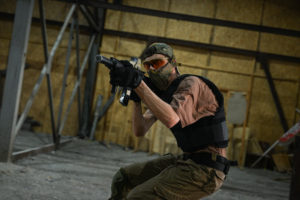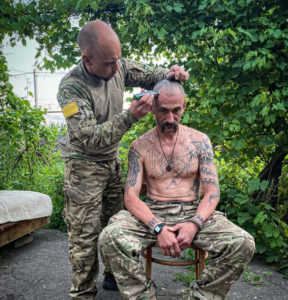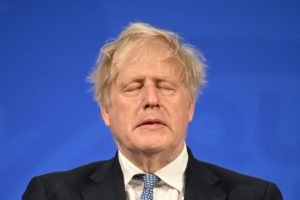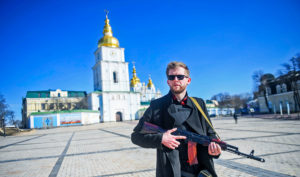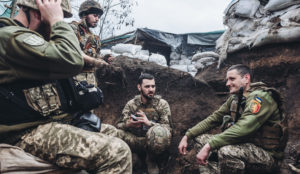A couple of weeks ago, I was smoking a cigarette outside my hotel in Kharkiv when a Ukrainian man, hearing me speak English, came over to show me a photo on his phone. It was of his 21-year-old son who he had just buried that day, killed fighting as part of a volunteer battalion outside Izyum. “He was my only son,” the man told me, “I still can’t believe my line has died out. I keep calling his phone and then remembering. Tomorrow I will join his unit and take his place.”
Though just a sad anecdote, this brief exchange highlights two opposing truths about the war in Ukraine. Firstly, that the Ukrainians possess an indomitable will to win, to beat the Russian invaders and reclaim control of their country in its entirety, whatever the sacrifices involved. But the other hard truth is that the human cost to Ukraine of the nation’s resistance to foreign occupation is very steep indeed. Almost everyone you speak to asserts that the official death announcements, currently standing at 200 soldiers killed daily, are understated. “A whole generation of boys is being wiped out,” the man told me. Reporting from the ground now emphasises the losses Ukraine is suffering, as outgunned troops struggle to hold their positions under constant shelling.
A new RUSI report, based on original research on the frontlines of eastern Ukraine and excellent access to senior Ukrainian commanders, outlines the challenge in sobering detail. The Russian army, stung by its operational failures in the war’s opening weeks, has adapted its way of war, abandoning its early attempts at grand encirclements using fast-moving armoured columns. It now relies on artillery to grind down defensive positions along with the Ukrainian army’s ability to resist, and then masses infantry and armour in localised spearheads to seize the ruins with overwhelming force, currently outnumbering the Ukrainian defenders seven to one. This allows “Russian forces to make greater progress in urban fighting, with casualty rates among Russian and Ukrainian units currently approaching parity, despite the Russians usually being on the offensive”. As one Ukrainian commander on the frontline told me, “all we can do here is slow down the Russian advance”.
Instead of sweeping pincer movements, enclosing Ukrainian positions in their armoured jaws, the Russians have adopted a “bite and hold” strategy, nibbling away at small, localised targets with the seeming confidence that time is on Moscow’s side. As the RUSI paper observes, “although Ukrainian troops are much better motivated, Russian numerical superiority and the ability to kill Ukrainian forces with artillery as they manoeuvre mean that Ukrainian units continue to cede ground and to pay disproportionately on the offensive”.
At the heart of Russia’s local successes in the Donbas lie Moscow’s vast advantages in artillery firepower, making up for the lacklustre quality of its infantry, which won such mockery — and perhaps stoked a dangerous over-confidence — from Western observers earlier in the war. Man for man, the Ukrainians remain better soldiers, but they’re now being killed in unsustainable numbers without ever seeing the enemy.
Striking an urgent note of warning, the report cautions that “several Russian advantages and Ukrainian weaknesses are leading to an attritional conflict that risks a protracted war, eventually favouring Russia”. Firstly, Russia’s artillery firepower is effective not only at reducing Ukrainian strongpoints but also in preventing Ukrainian forces from massing for counterattacks. Russia “fires approximately 20,000 152-mm artillery shells per day compared with Ukraine’s 6,000”, drawing not only from new production but from Soviet stocks, of which “by some estimates, several years’ worth still remains”. Adding to the disparity, long-range Russian missile strikes are destroying Ukraine’s defence infrastructure, eroding the country’s capacity to sustain what may become a years-long war.
Secondly, the supply of replacement materiel from Western stocks has enabled the Ukrainians to survive, but is inadequate to procure a strategic victory. Furthermore, the mash-mash of donated vehicles and weapons systems from Nato’s diverse stocks has left the Ukrainians with a complex and unwieldy supply and maintenance train.
Thirdly, Ukraine’s vast mobilisation of fighting men is providing the necessary mass to fight a high-intensity war at such scale, but at the cost of experience, so that “a shortage of skilled infantry and armoured operators is limiting Ukraine’s offensive combat power”, while “limited staff capacity is limiting Ukraine’s ability to plan and execute combined operations at scale”. As the report’s authors warn, “Ukrainian victory is possible, but only with international support.”
It all makes for sobering reading: a necessary dose of clarity in an information space muddied by the dopamine-fuelled boosterism of each side’s social media supporters, all proclaiming their own faction’s tactical victories to be decisive, and their own defeats cunning strategic masterstrokes. But as Churchill cautioned after Dunkirk: “Wars are not won on evacuations” — and nor are they won by retweets. Indeed, perhaps the over-confident emphasis on Ukraine’s victories earlier in the war, by feeding complacency in the West and lessening the sense of urgency and threat the country still faced, helped lay the groundwork for the difficult position Ukraine now finds itself in. The hard truth is that to achieve a strategic victory, Ukraine will need to recapture and hold its lost territory, and this goal now seems to be stretching beyond the country’s capabilities.
Yet this does not mean, as Russia’s increasingly self-satisfied online supporters now boast, that Putin has won the war. The Russians too have been suffering heavy losses, and are throwing conscript levies from the separatist republics into the Donbas meatgrinder. CNA’s Michael Kofman has asserted that the “long-term trends still favour Ukraine”, though he hedges that this prediction is “conditional on sustained Western military assistance, and is not necessarily predictive of outcomes”.
In truth, the war’s final outcome is unknown. Yet the fundamental dynamics that persuaded many commentators, including me, to predict an easy Russian victory before the war began have not yet altered enough for confidence in Ukraine’s eventual victory to be absolute. Despite its heavily-publicised, staggering losses, Russia retains the comparative advantage in materiel with which it began the war. Just as dangerous for Ukraine, the country’s support from Western nations remains as piecemeal and wavering as it was from the start.
Having abandoned illusions of a swift victory, Russia seems to have settled on a strategy of grinding Ukraine down over the long haul, banking on the weariness of the country’s Western allies to make them slowly taper down their support. As so often, Europe’s weakest link is Germany, utterly dependent on Russian energy thanks to Merkel’s willful naivety. With the German economy seemingly entering a death spiral, German politicians warning of energy rationing, and ordinary Germans causing a shortage of woodburning stoves and firewood as they stockpile for the hard winter ahead, Berlin’s already paper-thin resolve to sacrifice its own comfort for Ukraine’s security represents a major hazard for Kyiv. A united Western determination to face down Russia’s aggression is unlikely to survive the winter: to win the war decisively, the Ukrainians will need to claw back ground this summer, or face a grinding war of attrition in which the odds will become increasingly stacked against them.
Certainly, some of the Western supplies trickling into Ukraine have enabled the defenders to hold their ground and make the Russians pay as heavily as possible for the ground they take. In the south, around Kherson, the Ukrainians have been able to launch a counteroffensive, making slow but meaningful gains, an operation on which optimistic narratives of Ukrainian victory are now centring their hopes. The long-range artillery systems for which the Ukrainian government spent early summer pleading have begun to arrive, and are enabling Ukrainian forces to strike Russian munitions stockpiles far behind the front lines, somewhat denting Moscow’s advantage in artillery. Similarly, artillery platforms like the French CAESAR system have lessened the threat of an amphibious assault on Odessa, guaranteeing the survival of at least some of Ukraine’s hold on its Black Sea coastline for the foreseeable future, and forcing Russia’s retreat from the strategically — and symbolically — significant outpost on Snake Island.
But as the RUSI report’s authors caution, “the scale and longevity of support that Ukraine requires is significant and will stretch many Western allies. These requirements cannot be met through the donation of existing stocks but will instead require the production of new munitions.” This is precisely what our new Chief of General Staff was urging when he warned last week that, due to “ammunition expenditure rates that would exhaust the combined stockpiles of several Nato countries in a matter of days”, Britain and other European nations must begin an urgent programme of wartime-scale munitions production, not just for Ukraine’s sake, but also for our own. As he warned: “We can’t be lighting the factory furnaces across the nation on the eve of war; this effort must start now if we want to prevent [a wider European] war from happening.”
But as always with Johnson, fine words were not matched by the necessary deeds. There is no point involving Britain in a proxy conflict with Russia unless we are prepared to win it. But like other Western nations, Britain is providing Ukraine with enough materiel to fight, but not enough to win. Johnson has staked the remnants of his political reputation on Ukraine yet is unwilling to do what is necessary to either stave off a Russian victory, or to rebuild our own armed forces to meet the grave demands of the moment. Who will replace Johnson, and what their Ukraine policy will be are absolute mysteries. All the high-flown symbolic diplomacy and all the publicity stunts in Kyiv are not enough to stave off the sense that we are sleepwalking into disaster.
Without a massive European rearmament programme, only the United States possesses anything approaching the spare armaments and munitions in sufficient quantities to build a Ukrainian force capable of regaining the initiative on the battlefield. Yet even here the prognosis is grim: the Biden administration, which perhaps foolishly has openly linked rising petrol prices to its support for Ukraine, is plumbing historic lows as it stumbles towards what will likely be catastrophic midterm elections. The ascendant wing of the Republican party is more or less openly supportive of Putin, projecting its distaste for its domestic enemies onto Ukraine, and prominent foreign policy realists in the American defence establishment urge a winnowing of American support for Europe to focus on the greater strategic threat posed by China in the Pacific.
Back in Kharkiv, a month and a half ago, I sat in the back of an SUV with two Territorial Defence volunteers, both middle-aged businessmen from Kyiv, as we waited for an Explosive Ordnance Disposal team to detonate the unexploded Russian ordnance ahead of us and clear the road to their positions. Russian forces, back then, had just been pushed back from the positions on the city ring road from which they pummeled the battered Saltivka district with artillery fire, and Ukrainian forces were cautiously optimistic while worrying about the winter ahead. “Will it be a problem, petrol prices in America?” Avden, the platoon commander asked me suddenly. “I hear all over America they are paying $5 for petrol. Putin knows this. That’s why we need to win the war quickly, before summer is over.”
But we are halfway through the summer now, and the war is nowhere near over. On my return to Kharkiv, a couple of weeks ago, the bombardments were back every night, as the Russians deployed longer-range artillery to fire randomly on the city. Even if Ukraine conducts a fighting withdrawal from the Donbas over the course of the summer, it is not clear that Russia will pause its slow but accelerating advance, or that border cities such as Kharkiv will not once again come under direct assault. The Ukrainian state responded to the invasion with greater competence and cohesion than anyone expected, and the Ukrainian people have displayed a determination to win against all odds that will go down in history.
But as the RUSI report makes clear, a strategic victory in this war ultimately depends on the will and determination of Western leaders. Fuelled by victories in the Donbas, a Russian narrative will develop that Moscow’s final victory is certain, and support for Ukraine is a doomed and pointless effort. This is not the case. A Russian victory in Ukraine is not inevitable, but preventing this outcome will require a pan-Western effort not far short of full wartime mobilisation, an effort which is so far not taking place. The relentless optimism of Ukraine’s online supporters, though understandable, does not accurately reflect the strategic picture, and may instead be hindering a popular understanding of the grave challenges that lie ahead. Ukrainians are doing everything in their power to win this war, and suffering terribly in the process: but unless their sacrifice and solidarity is matched in Western capitals, it may still not be enough.
Disclaimer
Some of the posts we share are controversial and we do not necessarily agree with them in the whole extend. Sometimes we agree with the content or part of it but we do not agree with the narration or language. Nevertheless we find them somehow interesting, valuable and/or informative or we share them, because we strongly believe in freedom of speech, free press and journalism. We strongly encourage you to have a critical approach to all the content, do your own research and analysis to build your own opinion.
We would be glad to have your feedback.
Source: UnHerd Read the original article here: https://unherd.com

